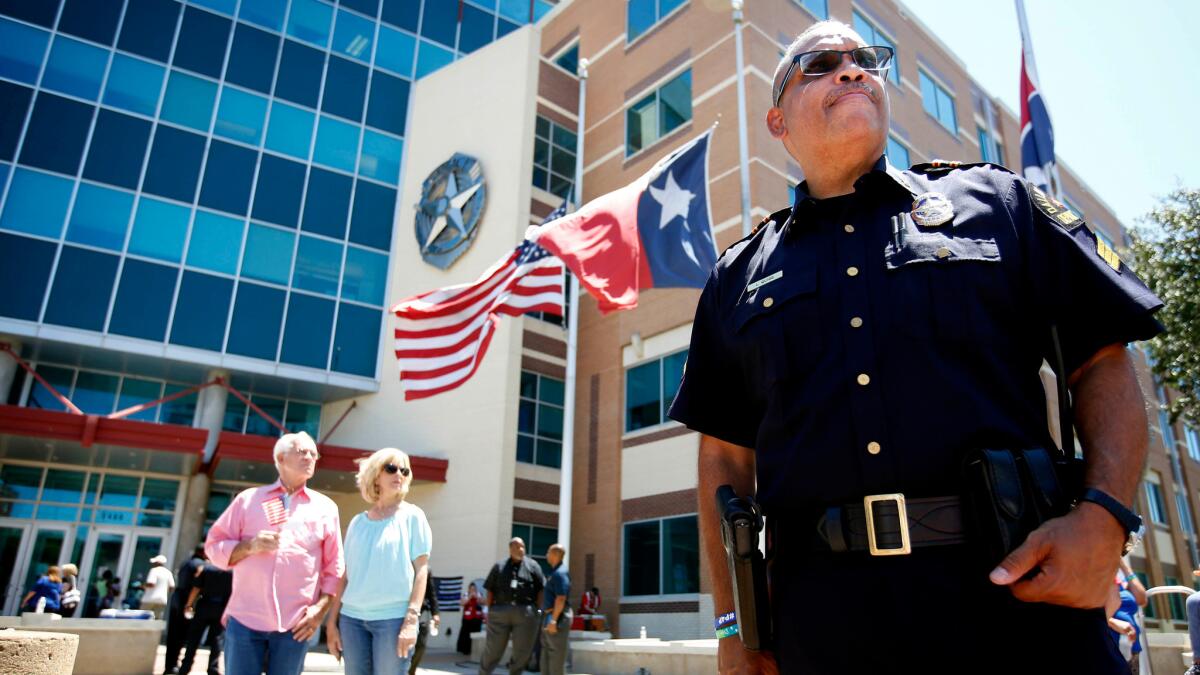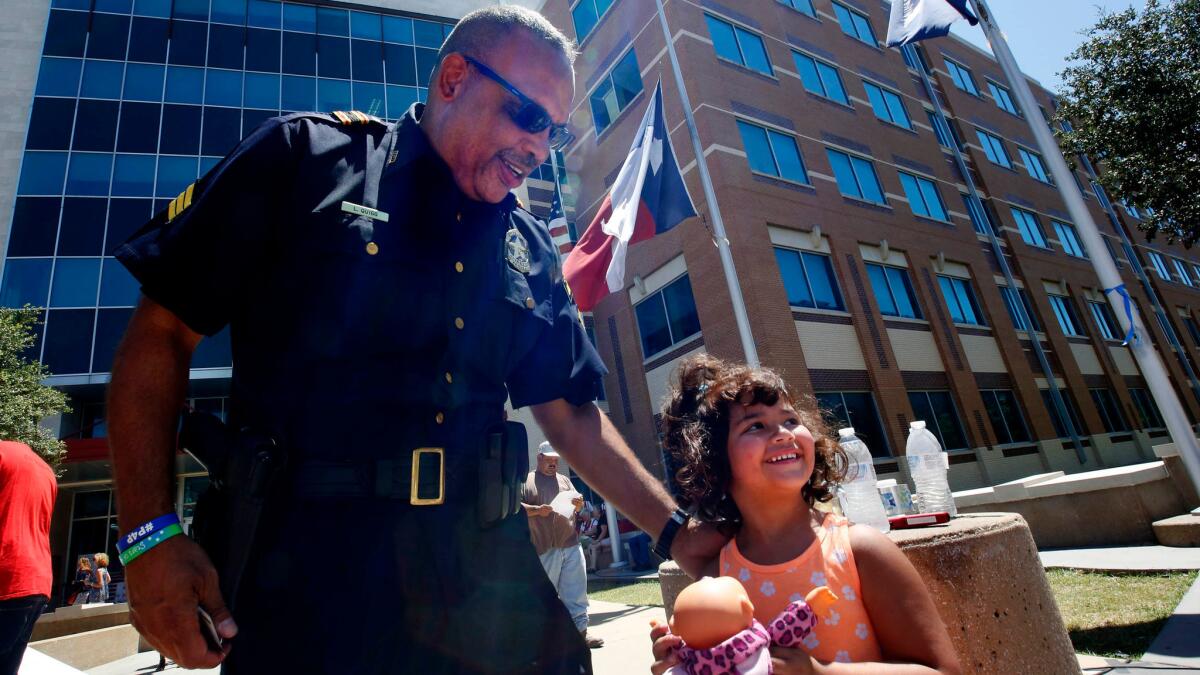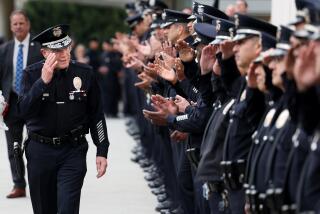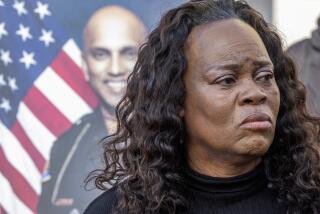For a black Dallas police officer, a never-ending effort to build bridges

- Share via
Reporting from Dallas — In Sgt. Leroy Quigg’s long career with the Dallas Police Department, two moments in particular capture his difficult and delicate mission.
When riots erupted in Los Angeles in 1992, Officer Quigg found himself facing a backlash in black neighborhoods of south Dallas. “People would say, ‘You going to beat me like Rodney King?’” recalled Quigg, who is African American.
They branded him an Uncle Tom, accused him of “working for the white man.”
Later, as a member of the anti-gang unit, Quigg proposed launching a gang intervention program for youth. But fellow officers balked — and questioned his intentions.
“They would say, ‘Quigg, how can I trust you anymore? You’re trying to help them. If I pull someone over and need you to cover me, you might not,’” he said.
As a result, Quigg has worked for years to build trust. Slowly, persistently. That’s been a constant for the 50-year-old Quigg, who has spent half his life on the force, and it’s a challenge for African American police officers across the country.
See more of our top stories on Facebook »
To those who called him an Uncle Tom, he would say, “I’m not working for them, I’m working for you.”
When he arrested young black men, he tried to reason with them. More than once, he’d say, “You’ve got to change your ways. Martin Luther King and Malcolm X, they died for you. Quit blaming the white man and take responsibility.”
Fellow officers were another matter. When he proposed the gang intervention program, his supervisor, who was black, dismissed the idea as a conflict of interest. As they faced off, Quigg replied: “How is it a conflict if I’m trying to change a kid’s mindset so he’s not committing crimes?”
Then he took off his badge, removed his gun from the holster and set them on the table.
“He backed off,” Quigg said of his boss. The program launched and grew over the years to include a traveling basketball team that’s going to Las Vegas this month, trips to the Grand Canyon and cautionary school presentations by former gang members. There are even classes in etiquette.
These days Quigg is among those trying to secure a city on edge after a black gunman targeted white officers, killing five — including one Latino — and wounding nine.
“Everybody is on high alert. We don’t know who might sneak up on us,” he said.
But Quigg knows racism influences how young black men are treated by police and that tempers have risen in recent weeks over several videos of fatal police shootings.
“They just want to be treated fairly, treated as human beings, without being viewed as a threat,” he said.

About a quarter of the Dallas police force is black, including Chief David Brown, with their own Black Police Assn. They are, as they say, both black and blue. As racial tensions flare nationwide and city leaders talk of building bridges, it’s black cops like Quigg who are tackling the conflict on patrol, helping both sides confront past mistakes and improve relations.
Black officers have clashed publicly with the department over the years on issues big and small. A previous chief provoked a backlash when he banned natural black hairstyles, including dreadlocks and twists, an edict the department later rescinded, but only after some officers were placed on leave and fired. Under another past chief, black officers, including Quigg, successfully sued for promotions they’d been denied while white officers with more serious disciplinary records rose through the ranks.
“We had officers who were demonized or vilified because they went and testified and were plaintiffs in lawsuits,” said Lt. Thomas Glover, president of the Dallas chapter of the National Black Police Assn., adding that the department was troubled and the lawsuits “made it better.”
But he said black officers still often “go neutral and give up some of their culture” to blend in, from the way they dress to the music they listen to.
“You tend to water down or scale back those things that may have been part of how you grew up. Some officers believe that helps them blend in,” he said.
Quigg, accustomed to navigating racial divides, belongs to the Black Police Assn. and three other police groups in town. He was born to a white mother and a black father in 1966, a time when critics hurled racial slurs at his mother and bricks at the family’s window in Toledo, Ohio. He was the rare black student in his Catholic school, and until eighth grade he thought of himself as white.
Then he met a black neighbor playing basketball, they became best friends, and everything changed. Quigg traded country music and AC/DC for R&B, Ice-T and Run-DMC.
“I was trying to find myself,” he said.
After majoring in criminal justice at the University of Toledo, he joined the Army, and was eventually stationed at Ft. Hood in Texas. After he left the military in 1990, he decided to join the Dallas Police Department, back when they had about half as many black officers “and a lot of them didn’t have rank.”
Quigg was partnered with a hefty white officer, Senior Cpl. Norman Smith, whom everybody called “the Big Russian.” Smith’s wife was black, and he “knew how to talk to black folks” on the beat, who would call him “a white black brother,” Quigg said.
Climbing out of his squad car to greet a group of gang members on a south Dallas street corner, Smith would “dap” them or knock fists “so smooth, interacting with respect but still gathering info,” Quigg said. “That’s how we solved a lot of homicides.”
These days, with tensions running high and crime surging in the city, Quigg said, “If we had more officers like that, it would help.”
But in 2009, Smith, then 43, was gunned down while serving an aggravated-assault warrant on a black suspect, whose cousin was later convicted of murder and sentenced to life in prison.
To honor Smith, police parked a flower-draped cruiser in front of headquarters, just as they have now for the five fallen officers. A vigil drew not only police, but hundreds of black gang members, a testament to Smith’s police work, Quigg said.
Quigg now encourages protesters and black residents critical of the department to come see everyday police work to better understand their use of force.
“Ride out with me, with the police officers, and you can see the decisions we make, the split-second decisions,” he said.
Det. Major Berry, a 14-year department veteran who is also black and knew all of the officers killed in the attack, said he tries to explain police procedure to friends and relatives.
“As an everyday citizen, you don’t necessarily understand, ‘Well, why did he pull me over?’” he said. “I can give them that insight.”
One thing that strikes Quigg is how much activists and community leaders seem to care more about police shootings than ongoing crime in black neighborhoods. In one day last July, he said, two black men were killed in gang-related shootings on the same road.
“No one mentioned anything: No Black Lives Matter, no preachers. Those two black men died within 24 hours on the same street, and I didn’t see any protests, any grieving relatives, and I’m asking why?” Quigg said.
The topic came up when a young black man, Joseph Offutt, approached Quigg.
Quigg talked about what needs to be done to those who commit violence.
“It’s not just police shooting a black guy: It’s black-on-black crime,” he said as Offutt, 22, nodded. “If a police officer kills someone, it should be a full investigation. But when a young black kid gets killed it should be the same outreach.”
At the memorial, Quigg was constantly approached by families wanting to shake hands and hug. Children wearing police badge stickers looked at him in awe before posing for photos.
Quigg said he gets the same treatment in south Dallas, where residents have gone from flipping him the bird to waving.
“I walked into 7-Eleven and everybody’s breaking down the door to buy me a soda,” he said.
He’s not sure how long the goodwill can last.
“They’re waving now, so who knows,” he said. “Maybe this tragedy will bring us together.”
Twitter: @mollyhf
‘Farewell, brother’: Dallas police mourn their fallen officers
A city in mourning: With many services, Dallas buries its dead
How Black Lives Matter activists are moving forward after the Dallas shootings
More to Read
Sign up for Essential California
The most important California stories and recommendations in your inbox every morning.
You may occasionally receive promotional content from the Los Angeles Times.











